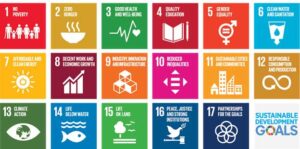
Armed Conflicts, Civil Society, Featured, Global Governance, Headlines, Human Rights, IPS UN: Inside the Glasshouse, Middle East & North Africa, TerraViva United Nations

Schools-turned-shelters run by the UN agency for Palestine refugees, UNRWA, have suffered serious damage in strikes in the last week. July 2024. Credit: United Nations
– The Biden administration, which has come under heavy fire for its unyielding pro-Israeli stand on the nine-month-old war in Gaza, is facing a rebellion within its own bureaucratic ranks—12 and counting.
The 12 government officials, who recently resigned, have accused the US of providing diplomatic cover for the continuous flow of arms to Israel ensuring “our undeniable complicity in the killings and forced starvation of a besieged Palestinian population in Gaza.”
This is not only morally reprehensible and in clear violation of international humanitarian law and US laws, but it has also put a target on America’s back,” they continue, arguing that it has put the lives of service members and diplomats at risk.
Dr. Alon Ben-Meir, a retired professor of international relations, most recently at the Center for Global Affairs at New York University (NYU), and who taught courses on international negotiation and Middle Eastern studies, told IPS: “I share the overall view of the 12 US government officials who have resigned in protest against the Biden administration’s policy in connection with the Israel-Hamas war”.
They wrote in their joint statement, titled Service in Dissent, that “America’s diplomatic cover for, and continuous flow of arms to Israel has ensured our undeniable complicity in the killings and forced starvation of a besieged Palestinian population in Gaza. This is not only morally reprehensible and in clear violation of international humanitarian law and US laws, but it has also put a target on America’s back.”
https://jointstatement.tiiny.site/
“I have supported Israel’s right to defend itself as well as the Biden administration’s support of Israel’s war efforts, standing by the US’s iron-clad commitment to Israel’s security by providing it with all necessary military aid and political cover.
“I have stated time and again that Hamas’s unprecedented October 7, 2023 attack and Israel’s unparalleled retaliation have reinforced my own view, which I share with many others, that there will be no resolution to the 76-year-old Israeli-Palestinian conflict short of a two-state solution.
I still hold to the position that it will be impossible to return to the status quo that prevailed before October 7, as a new paradigm was created that offered the inimitable opportunity to recommence the peace negotiations that could lead to a two-state solution,” said Dr Ben-Meir.
Meanwhile there have also been negative reactions in European capitals. Last February, the New York Times ran a story headlined “US and European officials release a Letter Protesting Israeli Policies.”
According to the Times report, more than 500 officials in the US, Britain and the European Union (EU) released a “public letter of dissent” against their (respective) government’s support of Israel in its war in Gaza.”
In an oped piece published on the IPS wire July 18, Mouin Rabbani, Co-Editor of Jadaliyya and Non-Resident Fellow with the Center for Conflict and Humanitarian Studies (CHS), says the Letter of Dissent makes indisputably clear that US policy towards the present crisis has been an absolute failure at virtually every level.
Not only has it failed to achieve any of its objectives and further consolidate Western hegemony in the Middle East, but it has made the US government directly and actively complicit in the genocide currently before the International Court of Justice in The Hague, he said.
As the signatories note, the US is “wilfully” violating not only international laws that are binding upon Washington, but is similarly and knowingly violating US domestic law in its fanatic determination to see Israel’s mass atrocities through to the bitter end, said Rabbani, who is also a Non-Resident Fellow at Democracy for the Arab World Now (DAWN).
“Tellingly, and quite accurately, they also point out that the Biden administration’s determination to stand shoulder-to-shoulder with Israeli Prime Minister Netanyahu and his ultra-rightist, annexationist government has led to the suppression of basic constitutional freedoms within the United States,” he declared.
Meanwhile, in an address to the UN Security Council on July 17, Secretary-General Antonio Guterres warned that recent developments are driving a stake through the heart of any prospect for a two-State solution.
“The geography of the occupied West Bank is steadily being altered through Israeli administrative and legal steps. The seizure of large land parcels in strategic areas and changes to planning, land management and governance are expected to significantly accelerate settlement expansion”.
These changes, he pointed out, include the issuance of two military orders at the end of May. These orders transferred powers to, and appointed, a civilian deputy in Israel’s Civil Administration, which is alarming.
This move is another significant advance in the ongoing transfer of authority over many aspects of daily life in the occupied West Bank, and a further step towards extending Israeli sovereignty over this occupied territory.
If left unaddressed, these measures risk causing irreparable damage, he said.
“We must change course. All settlement activity must cease immediately. Israeli settlements are a flagrant violation of international law and a key obstacle to peace. The violence must end, and the perpetrators of the violence must be swiftly brought to justice.
Israel must ensure the safety and security of the Palestinian population, Guterres declared.
Elaborating further Dr Ben-Meir said: “Personally, I was in favor of crippling Hamas militarily. Still, I have also repeatedly stated that while Israel may be able to crush Hamas militarily, it will be unable to destroy it as a political movement that holds a specific ideology that calls for Israel’s destruction.
“However, I have never subscribed to the notion that Hamas will ever be in a position to extinguish Israel for many reasons, including the fact that Hamas leaders know only too well that Israel is a formidable military power whose existence is irrevocable. The war has made it clear that challenging Israel’s right to exist is tantamount to suicide”.
President Biden was the first global leader to affirm that, given the new developing circumstances, a two-state solution is a prerequisite to end this endemic conflict.
As the war continued to grind on and as the Palestinians’ death toll and destruction were mounting, and Prime Minister Netanyahu categorically refused to even mention any solution along the lines of an independent state, the whole idea of a two-state solution was dropped from Biden’s lexicon. But the flow of weapons to Israel, if anything, was increasing without any preconditions.
Moreover, the US vetoed two UNSC resolutions that called for a ceasefire while food, water, fuel, and medical supplies were dwindling, and the displacement of Palestinians by the hundreds of thousands continued unabated.
Meanwhile, Israel’s relentless bombing using American-made bombs, which were killing thousands in densely populated areas, made the US complicit in the horrific carnage. By now, more than 37,000 Palestinians have been killed, and more than half of Gaza lies in ruin, Dr Ben-Meir said.
IPS UN Bureau Report
















